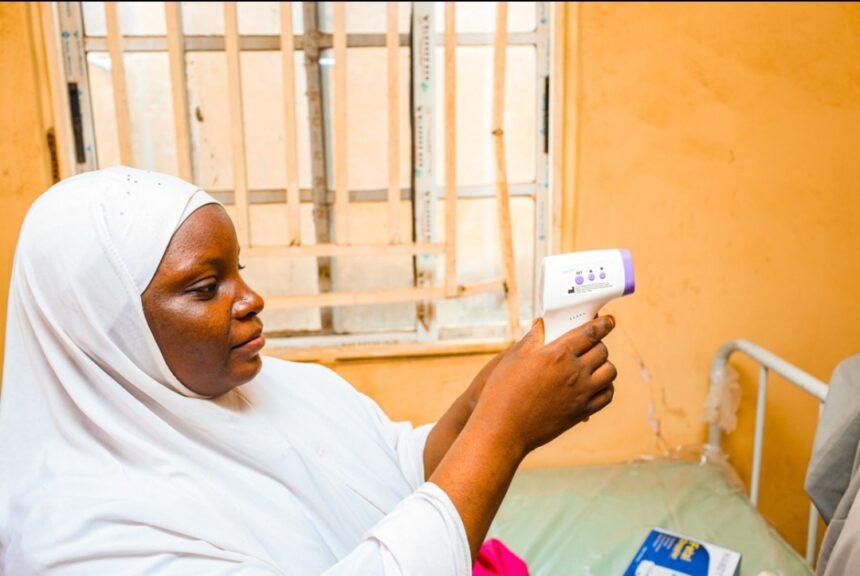
In Barden Barade, a remote village tucked within Sokoto State’s dry plains, something extraordinary happened this week — light returned. But not just light from a bulb. This was light that brought hope, dignity, and the promise of life.
For the past five years, the village’s only primary healthcare center stood in silence — its doors locked, its wards dark, its beds removed. At night, when labor pains started, expectant mothers were rushed out of the village in desperation, sometimes traveling over 20 kilometers in search of care. Others gave birth on the floor of the abandoned hospital, aided only by midwives holding phone torches between their teeth.
“Many of us feared we wouldn’t survive childbirth,” said Maryam Abubakar, a mother of four. “My last child was born on a mat, with only the light of a small phone. The nurse kept shifting the torch with her mouth. I cried not from pain, but fear.” That fear is no more.
This week, CREACC-NG, a Nigerian non-profit organization championing community resilience and climate justice, launched the HealthVoltaic Initiative in Barden Barade. The initiative brings solar-powered energy systems to rural health centers cut off from the national grid.
With support from community stakeholders and generous partners, the team installed: A HealthVoltaic solar generator, Roof-mounted solar panels, medical equipment, including Doppler fetal monitors and digital thermometers, Rechargeable lights and fans, Beds and basic emergency supplies
For the first time in years, delivery rooms once sealed and abandoned were reopened. Midwives walked proudly into wards now lit by solar energy. Mothers now lie on beds, not mats. The hospital, which never operated at night, now runs 24/7.
“No woman will give birth in the dark again,” declared Umma Muhammad, the hospital’s Officer in Charge. “No more using torchlight with our mouths. No more losing mothers because of light. This is a new beginning.” At the unveiling ceremony, Alhaji Mamman, the traditional leader of Barden Barade, stood with tears in his eyes.
“For years, we begged for help. We watched our women suffer. Today, we have light — not just in bulbs, but in our hearts,” he said as he formally launched the HealthVoltaic system. “This is one of the greatest things to happen to our community.”
The community turned out in large numbers. Women ululated. Children danced around the solar panels. The Ward Development Committee (WDC) members, who serve as custodians of the hospital’s welfare, pledged to supervise and protect the solar generator and ensure the project is sustained.
“We’ve waited so long. Now it’s here, we won’t let it fail,” said Malam Nura, a member of the WDC. “This energy system is for our mothers, our babies, and our future.” The transformation at Barden Barade is only the beginning.
CREACC-NG hopes to expand the HealthVoltaic Initiative to hundreds of off-grid rural health facilities across Nigeria. In a country where one woman dies every 13 minutes during childbirth, and where over 55% of primary healthcare centers have no electricity, the need is both urgent and immense.
“This is not just about power,” said CREACC-NG’s Project Lead. “It’s about restoring dignity to rural healthcare. It’s about saying no woman should die giving life — simply because there’s no light.” The HealthVoltaic Initiative aligns with Sustainable Development Goals 3 (Health) and 7 (Clean Energy) and presents a practical, low-cost, high-impact solution that is community-owned, climate-smart, and scalable.
But to take this movement beyond Barden Barade, funding is needed. Grants, private sector partnerships, and donor support can help replicate this success in other underserved communities — places where light is still a luxury, and delivery rooms are still covered in shadow.
Barden Barade was once a forgotten village, its hospital a symbol of abandonment. Today, it’s a beacon of what’s possible when communities believe, when organizations act, and when the world chooses to care. As the sun set on the day of the launch, the lights inside the hospital remained on — glowing quietly, confidently, like a promise kept. And in that light, babies cried, midwives smiled, and hope was reborn.
The post The Night the Lights Came On: How a Forgotten Hospital in Sokoto is Saving Lives Again appeared first on Kano Times.















